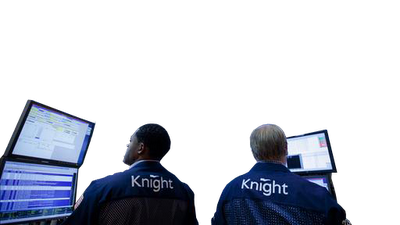Wall Street and its arcane world of securities trading — could anything be more complex? But really, the principles of stock trading are forthright and easily understood, and haven’t much changed in a couple centuries…
You buy fractional ownership in a corporation. You make money, if not through dividends or shares of profit, then by reselling your shares as their values tick higher. Thus the familiar refrain, buy low/sell high.
The complexities creep in as you try to wrest loose every erg of possible profit. Can revenue be gained when share prices rise by a quarter penny or so? It can, but only when you’re trading thousands of shares, thousands of times per second. Here’s where trading software comes in, the likes of which has revolutionized the securities market.
But it’s also imperiled it.
On August 1, 2012 the Knight Capital Group began executing a series of erratic, rapid-fire transactions that had over 100 stocks gyrating wildly for more than 45 minutes, until the NYSE suspended trading. In the meantime Knight was losing more than $10 million per minute, for a final hit that equaled more than quadruple that firm’s total profit last year.
The culprit of course was software. Knight was trying out a new trading algorithm that had been regrettably rushed into service without due testing and bug-fixing. When you or we come up against a bug, we might curse at a blue screen for a while. When it happens to a company like Knight (which executes trades for Citigroup, TD Ameritrade, and others, and was responsible for 11% of all U.S. securities trading in the first half of this year), markets shudder.
It’s a fact of life in this new century of ours that we rely on technology in more ways than we can count. It’s also a fact that our reliance sometimes outstrips the technology’s capabilities. There’s nothing abstract about binary code that can eliminate vast fortunes in the blink of an eye. We have software today that can bankrupt companies and destroy lives.
If we’re resolved to keep it, then we’d better find a way to make it work.
The C4:
- On August 1, a trading-software glitch caused 45 minutes of erratic stock transactions that have so far cost the Knight Capital Group $440 million and over 75% of their company value. They’re likely headed for bankruptcy.
- This is hardly the first time this sort of thing has happened. The Facebook IPO in May was marred by a $40 million glitch and the 2010 “Flash Crash” caused a thousand-point swing in the Dow Jones Industrial Average in just over six minutes.
- Every broker, day-trader, and 401k dabbler relies on stock-trading software. It’s made our modern securities market possible.
- But when it goes wrong the consequences are devastating. The risks here are way too high. Stricter regulation is never a popular solution, but if anyone has a better idea for protecting our markets from software glitches, we’re all ears.

